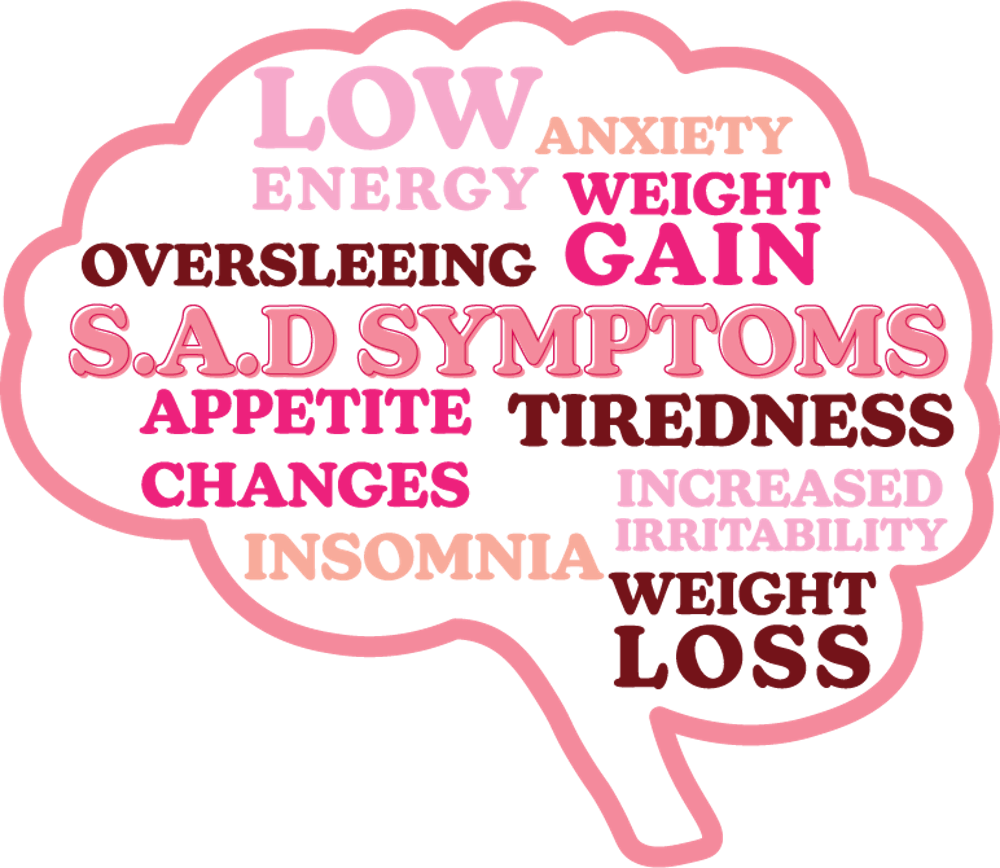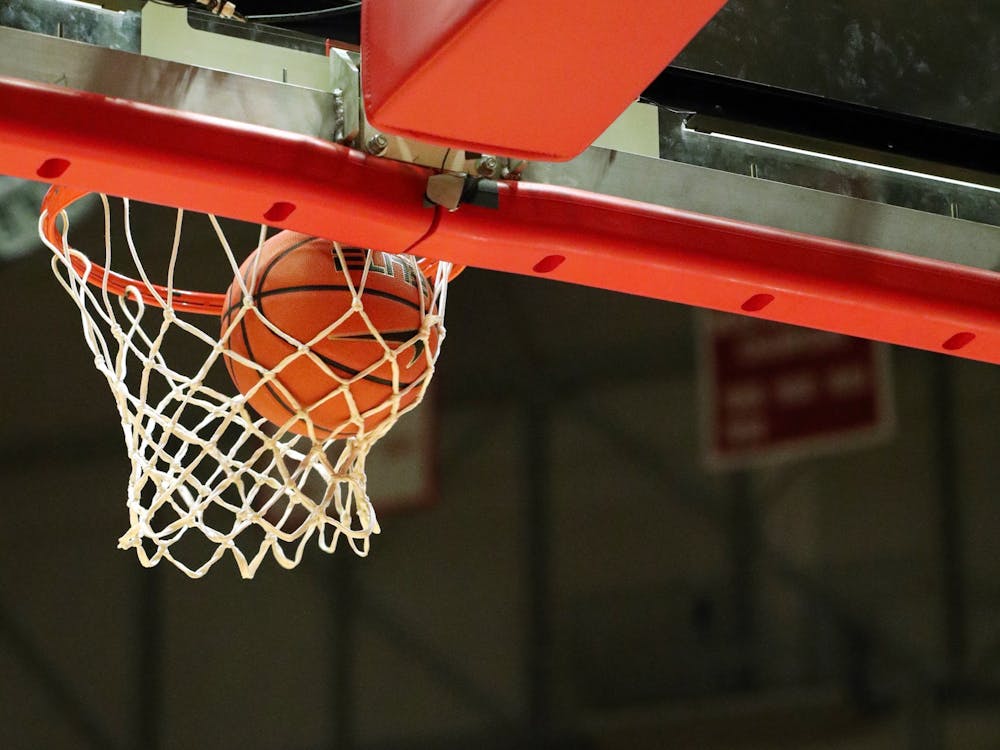Editors note: This story has been updated to correct a statement that referenced Still Waters Professional Counseling as a "faith-based" counseling service. Still Waters provides inclusive counseling to all members of the community.
As the days grow colder during the fall semester, many college students experience more than just a change in the weather.
Seasonal depression, also known as Seasonal Affective Disorder (SAD), affects a significant number of students, particularly in cities like Indianapolis, where “the percentage of time that the sky is overcast or mostly cloudy remain[s] about 57% throughout the season,” according to Weather Spark.
SAD is a mental health condition triggered by seasonal changes, typically starting in late fall and lasting through winter.
According to the Mayo Clinic, reduced sunlight during these months is thought to lower serotonin levels, which affects mood and disrupts the body’s circadian rhythm, impacting sleep and energy.
Nationwide, SAD is a mood-related condition that affects almost 5 percent of the U.S. population annually, and the symptoms can be present for nearly half of the year, according to McGovern Medical School.
For students at Ball State University, addressing this condition has become essential in ensuring mental health and academic performance do not suffer during the colder months.
Aubrey Driscoll, the associate director for prevention and wellness at Ball State’s counseling center, has recognized the challenges posed by Indiana’s harsher winters and taken significant steps to address seasonal depression among the student population.
“Seasonal affective disorder often begins in young adulthood. It can present very similarly to depression, with common symptoms including persistent sadness, feelings of hopelessness or helplessness, loss of interest in hobbies, decreased energy, difficulty concentrating, and changes in sleep or appetite,” Driscoll said via email.
The counseling center offers various services and resources to help students manage their symptoms and maintain their well-being during the drearier months. One of the most prominent resources the counseling center provides is light therapy.
“Light therapy boxes deliver a therapeutic dose of bright light that mimics outdoor light,” Driscoll said. “Research has shown that this type of light may lift one’s mood and ease some of the symptoms of seasonal affective disorder, such as tiredness or fatigue.”
According to the National Library of Medicine, nearly 42 percent of Americans are vitamin D deficient, which can exacerbate symptoms of seasonal depression. For some students, simply increasing sunlight exposure or taking vitamin D supplements can significantly improve their mood and energy levels.

The counseling center provides light therapy boxes on campus to help with this deficiency, offering a convenient and accessible way for students to combat the effects of seasonal depression.
According to the Mayo Clinic, light therapy is considered one of the most effective treatments for SAD, with many individuals experiencing significant improvements in their symptoms after regular use.
Regardless of the therapy's success, Driscoll emphasized the importance of proper usage.
“Before using any type of light therapy box, it is important to consult with a healthcare provider first to determine whether the use of light therapy is advisable and, if so, how it should be used,” she said.
Driscoll added that each light therapy box contains information about light therapy and instructions students should read and understand before using it. The resource and relaxation room at the counseling center in Lucina Hall 310-A has two light therapy boxes for student use.
In addition to light therapy, Ball State’s counseling center offers individual counseling services. These one-on-one sessions allow students to discuss their experiences with seasonal depression and develop personalized coping strategies.
The counseling center’s staff therapists are trained to address the unique challenges of SAD, helping students navigate the emotional and psychological impact of the disorder while balancing their academic responsibilities.
“The Ball State counseling center provides a wide variety of self-help/on-demand and professional resources to Ball State students. All counseling center services are free,” Driscoll said. “There are no session limits for individual therapy as we strive to work with each individual student to best meet their needs.”
She also highlighted that if students are concerned about their mental health during the colder months, they could explore this concern with a therapist at the office by scheduling a first appointment. At this appointment, students work with a therapist to create a plan that connects them with the resources that best fit their needs.
Second-year theater creation major Dylan Piazzoni has struggled with mental health challenges during the winter months.
“I think [therapy is] helpful in general, not even just for seasonal depression. But I think the bigger stipulation for it is you need to … acknowledge that you have a problem at first,” he said.
While Ball State University offers on-campus resources for seasonal depression, students can also benefit from the support available off-campus in Muncie.
Open Door Health Services provides various mental health services, including counseling sessions and screenings. According to its website, its behavioral health team is “committed to helping individuals and families regain control of their mental well-being by providing individualized care.”
Open Door also emphasizes its sliding fee scale, making mental health services more accessible for students with limited financial resources.
IU Health Ball Memorial Outpatient Behavioral Health offers extensive mental health services, including individual therapy, group therapy and psychiatric evaluations.
According to its website, its team “works together to provide comprehensive care for a wide range of mental health conditions.”
This facility provides specialized care for students experiencing severe symptoms of seasonal affective disorder or those who may require medication for their depression.
Still Waters Professional Counseling provides various counseling services.
According to its website, “Still Waters offers a judgment-free zone where clients can address their mental health concerns and develop coping strategies with the help of professional therapists.”
Their services focus on addressing a variety of mental health issues, including types of depression, anxiety and stress, while incorporating spiritual elements into their counseling approach.
When asked about the resources Still Waters provides for seasonally depressed students, owner Meredith Boatright said via email, “Still Waters provides individual ... therapy, as well as trauma-sensitive yoga classes led by a licensed therapist starting [at] the end of this month.”
While off-campus facilities provide mental health support, students can also adopt everyday strategies to manage seasonal depression on their own.
The National Institute of Mental Health (NIMH) and Mayo Clinic suggest several approaches.
For example, maximizing exposure to natural light by spending time outdoors, even on cloudy days, can boost mood and energy levels. Maintaining a regular sleep schedule also helps regulate mood and improves overall well-being, and physical activity reduces symptoms of depression and increases energy.
In addition, seeking professional support, whether through on-campus counseling services or off-campus resources, can provide students with personalized coping strategies and ongoing emotional support throughout the season.
For Piazzoni, something that worked for him was finding a support system.
“One [strategy] is to find a group of friends that you trust,” he said.
Piazzoni also believes that “college is more about embracing what we want to do and what our interests are,” emphasizing the value of engaging in activities and joining clubs that align with personal interests.
By taking advantage of these resources and personal coping strategies, students can better manage the effects of seasonal depression and maintain their academic performance and overall quality of life throughout the winter months.
“You're not alone,” Piazzoni said. “Your experience is uniquely individual to you, and you're not alone in how you feel.”
Contact Meghan Braddy via email at meghan.braddy@bsu.edu or on X @meghan_braddy.





